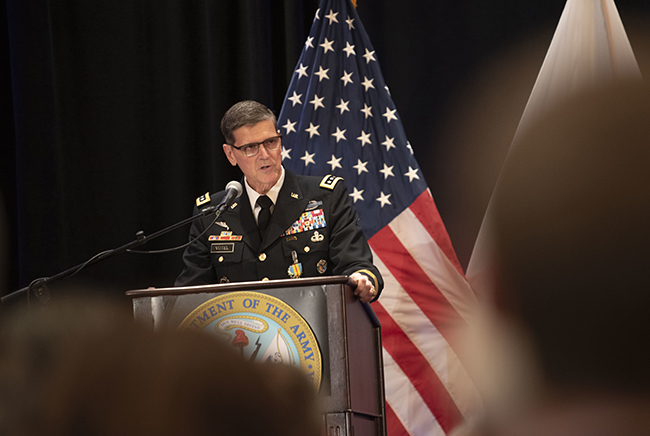
Now-retired Army Gen. Joseph Votel speaks at his Tampa, Fla., retirement ceremony on March 28, 2019. Defense Department photo by Lisa Ferdinando.
The US military needs to improve how it gathers and understands intelligence in current conflicts, and to avoid “strategic surprise” from near-peers across the globe, the former top US military officer in the Middle East said Sept. 4.
Retired Army Gen. Joseph Votel—who left the military earlier this year as the head of US Central Command and previously led US Special Operations Command—said that in his time overseeing forces, effectively gathering and understanding “big data” received on the battlefield was a major intelligence hurdle.
“We picked up a lot of information off the battlefield in Iraq and Syria, and the ability to understand that, get it into a useable format, and mine the data continues to be a challenge,” Votel said at the Intelligence and National Security Summit in National Harbor, Md.
Under Votel’s time in command of CENTCOM, military analysts were still trying to understand how to probe enemy social media and other open-source and publicly available information to make it “truly useful for the warfighter.”
While those issues focused on counterinsurgency and lower-intensity conflict, a series of intelligence challenges remain to be addressed as the US military focuses on near-peer competitors and potential conflict with Russia and China.
For intelligence, the “most important requirement will be preventing strategic surprise,” Votel said.
“We have to think about understanding the intent of adversaries out there, understanding what they are doing with advanced technology,” he said.
Outside of developing new tools, these countries are “changing traditional relationships that we’ve relied on in the past,” Votel added. For example, Turkey is becoming closer with Russia and moving away from the US and NATO. By not understanding Russia’s objectives with other countries, Votel argued, “We increase our vulnerability. We have to really be concerned about Russia is trying to do.”
Countering this means not just improving how the military gathers and processes intel, but also how it shares that information with close allies. Intelligence-sharing agreements, such as with the “Five Eyes” countries, are important, Votel said, though there are equally important partners outside that coalition that the US needs to continue to foster.